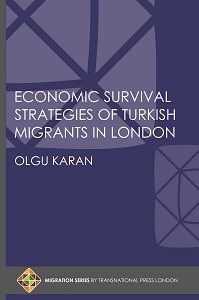Economic Survival Strategies of Turkish Migrants in London
Economic Survival Strategies of Turkish Migrants in London
Author(s): Olgu Karan
Subject(s): Politics / Political Sciences, Social Sciences, Economy, Geography, Regional studies, Economic policy, Migration Studies, Inter-Ethnic Relations, Socio-Economic Research
Published by: Transnational Press London
Keywords: MIGRANTS; Turkish; Kurdish; London; diaspora; enterpreneurs;immigration;
Summary/Abstract: Olgu Karan’s research offers original insights for anyone interested in how and why particular parts of London are now strongly identified with migrants from particular regions of the world.North London’s Green Lanes, a street stretching from Hackney to Haringey, or in local vernacular, from Stoke Newington to Wood Green, has undergone huge transformations over the past 50 years.Turkish Cypriot migrants first came in significant numbers to North London after the 1974 war that displaced hundreds of thousands of both Greek and Turkish Cypriots. They and later Turkish-speaking migrants mainly got jobs in London’s textile manufacturing industry. Those industries largely disappeared in the 1990s.In the 2010s Green Lanes now has several hundred Kurdish and Turkish restaurants and shops. These employ thousands of first, second and third generation Turkey-originating self-employed or family helpers. Karan’s research explains how this massive shift from employed status to self-employed took place. He records the economic devastation brought about by the rapid collapse of the textile industry, arguing this created the struggle for survival that forced thousands into self-employment. Insightfully, Karan also explores the economic basis of this shift. As textile workers, few Turkey-originating migrants had been able to save all the capital they needed to set-up take-away cafes, restaurants or off-licences and general food stores.The book traces the creation of ethnic partnerships and a willingness to provide loans to Imece/Zibare. These are the Turkish and Kurdish names given to village-scale collaborations for harvesting, constructing a water pipeline, providing security for village’s grazing borders with neighbouring villages.
Series: Migration Series
- Print-ISBN-13: 978-1-910781-48-7
- Page Count: 222
- Publication Year: 2017
- Language: English
- Table of Content
- eBook-PDF
- Sample-PDF
- Introduction

